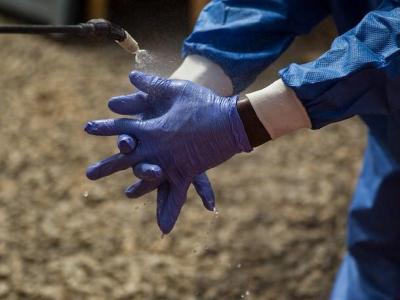May 20, 2004 (CIDRAP News) The US Senate yesterday overwhelmingly passed "Project BioShield," a 10-year, $5.6 billion program to promote rapid development and use of drugs and vaccines to counter biological and chemical weapons.
The BioShield program was first proposed by President Bush in January 2003, and the House passed a BioShield bill last year. Congressional leaders predicted that the House would quickly pass the Senate-approved version, which would send it to President Bush.
The legislation would allow the government to guarantee a market for promising drugs and vaccines for chemical, biological, and radiological agents. It would also enable the government to authorize the emergency use of drugs, vaccines, and other medical products that have not been approved by the Food and Drug Administration (FDA). The Senate approved the measure 99-0.
"Passing and implementing Project BioShield is without question the most important step we can take to improve our nation's bio-defense capabilities," Health and Human Services (HHS) Secretary Tommy Thompson said in applauding the Senate's action. "For example, funding from Project BioShield is already allowing us to acquire up to 75 million doses of the anthrax vaccine, beginning as soon as it becomes available next year."
An Associated Press report today said Senate passage of the bill was spurred by the anthrax and ricin attacks on Congress in the past few years and the recent detection of sarin gas in Iraq.
Sen. Judd Gregg, R-N.H., chairman of the Committee on Health, Labor, Education and Pensions, was a lead sponsor of the bill. A news release from Gregg's office said the measure:
- Enables the National Institutes of Health to issue research and development grants more quickly and improves the NIH's ability to use private experts and contractors
- Provides a special fund for countermeasures for biological, chemical, radiological, and nuclear agents
- Allows the HHS secretary to authorize the emergency use of a drug or medical product without normal FDA approval if there is evidence that the product may be effective and there is no approved alternative
Gregg's news release said the legislation authorizes $5.93 billion, "the amount appropriated for biodefense countermeasures in the DHS [Department of Homeland Security] Appropriations Act" for fiscal year 2004.
The AP report said the legislation specifically targets smallpox, anthrax, botulinum toxin, plague, and Ebola virus.
The report said the House overwhelmingly passed a Project BioShield last year. The story quoted Gregg as saying, "I expect the House to take our bill and move it on to the president."
The measure drew praise from Sen. Edward Kennedy, D-Mass., ranking member of the Health, Labor, Education and Pensions Committee. "The bill before the Senate guarantees that any company which develops a successful new product for these threats will find a willing buyer in the federal government," he said. "With that guarantee, companies will make the investments needed to prepare for any attack."
To view the bill:
Go to http://thomas.loc.gov/ and search S.15 under "bill number" for the 108th Congress.


















